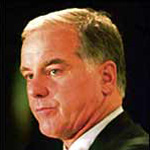 To stem runoffs, new ballots have voters rank top 3
To stem runoffs, new ballots have voters rank top 3By Jordan Schrader
Published October 18th 2007 in USA TODAY
"I knew I liked one, I knew I didn't like the other one, and the one I ranked in the middle I didn't have an opinion about one way or another," said Luce-Clark, who sought a candidate who would curb growth in this booming Raleigh, N.C., suburb.
In Cary and next month in Hendersonville, North Carolina is testing a system known as instant-runoff voting or ranked-choice voting. Backup choices are given to eliminate the need for runoff elections that cost extra money and tend to draw low turnout. If no candidate receives a majority on Election Day, then a winner is determined by adding the top two candidates' first- and second-preference votes.
The concept has long been a part of national elections in Australia and Ireland, according to FairVote, a group pushing it in the United States. A similar ballot will be used next month in San Francisco's mayoral election. It will be the fourth year that city has used it.
Burlington, Vt., and Takoma Park, Md., use the method, while Minneapolis, Oakland and Berkeley, Calif.; Ferndale, Mich., and Pierce County, Wash., seek to implement it, according to the FairVote website. North Carolina approved its pilot program last year.
Opponents of the movement, such as Joyce McCloy of the North Carolina Coalition for Verified Voting, have said it makes voting and counting the votes more complex.
Corey Cook, assistant professor of politics at the University of San Francisco, disagrees. Most voters can grasp instant-runoff voting and do even better with experience, Cook said.
Cook said government funding to educate voters, even after the first few elections, is a must.
McCloy suggested a ballot that gives "three different votes" to some voters violates the constitutional principle of "one person, one vote."
In a 1975 legal challenge to the early use of a ranked-choice ballot in Ann Arbor, Mich., then-circuit judge James G. Fleming found the system constitutional. Neither Diane Russell, director of the Instant Runoff Voting program for FairVote, nor McCloy said they knew of any recent challenges.
Voters interviewed at Cary polling places Oct. 9 found the town's ranked-voting system easy to understand.
"I thought it was really positive," said Alex Funk, a retired engineer who biked to the Herbert C. Young Community Center to vote. "I mean, why do all this twice?"
An exit poll survey designed by North Carolina State University assistant political science professor Michael Cobb found 96% of voters considered the system at least "somewhat easy to understand."
No candidate for the Cary Town Council's District B seat won a majority, so two days later election workers gathered to sort the ballots by hand. They logged the backup choices of voters to determine which of top vote-getters, Don Frantz and Vickie Maxwell, had won.
Frantz, owner of an auto repair shop, emerged the winner by a margin of 48 votes. After learning of the totals Tuesday, however, he was torn about whether the town should have another instant-runoff race.
Frantz said he heard from many confused voters on the campaign trail.
"I found myself, when I was at some places, that's all I was doing … explaining the new voting system," he said.
Schrader reports for the "Asheville (N.C.) Citizen-Times"
 On March 16th, Former Vermont Governor and Democratic National Committee Chair Howard Dean continued his support for instant runoff voting on Vermont Radio's Mark Johnson Show. Commenting on Burlington's recent IRV election, Dean said "I think the best and most democratic way to use to elect people in multiparty elections is instant runoff voting." Dean also supported the system when it was first used in Burlington in 2006.
On March 16th, Former Vermont Governor and Democratic National Committee Chair Howard Dean continued his support for instant runoff voting on Vermont Radio's Mark Johnson Show. Commenting on Burlington's recent IRV election, Dean said "I think the best and most democratic way to use to elect people in multiparty elections is instant runoff voting." Dean also supported the system when it was first used in Burlington in 2006. Citizens of Burlington, Vermont went to the polls on Tuesday, March 3rd to vote for the second time in an election using instant runoff voting. At 8:25 PM, the city declared that incumbent Mayor Bob Kiss had won reelection in the third and final round of counting, narrowly edging out challenger Kurt Wright, 51.5% to 48.5%. The race was unique in that it had four candidates that had a legitimate shot at winning: Progressive Kiss, Republican Wright, Democrat Andy Montroll, and independent Dan Smith. In most other American cities, there would be fear of "spoiler" candidates, but IRV allowed all four candidates to run without having to worry about being labeled "spoilers."
Citizens of Burlington, Vermont went to the polls on Tuesday, March 3rd to vote for the second time in an election using instant runoff voting. At 8:25 PM, the city declared that incumbent Mayor Bob Kiss had won reelection in the third and final round of counting, narrowly edging out challenger Kurt Wright, 51.5% to 48.5%. The race was unique in that it had four candidates that had a legitimate shot at winning: Progressive Kiss, Republican Wright, Democrat Andy Montroll, and independent Dan Smith. In most other American cities, there would be fear of "spoiler" candidates, but IRV allowed all four candidates to run without having to worry about being labeled "spoilers." On April 4, Vermont governor Jim Douglas chose to veto legislation to re-establish majority elections for Congress in his state through instant runoff voting. Vermont would have been the first state to enact IRV for Congress; legislative leaders affirmed their commitment to the bill, and it is sure to move in the state again. FairVote has worked hard to support this legislation, which likely generated more than 600 phone calls to the governor from Vermonters.
On April 4, Vermont governor Jim Douglas chose to veto legislation to re-establish majority elections for Congress in his state through instant runoff voting. Vermont would have been the first state to enact IRV for Congress; legislative leaders affirmed their commitment to the bill, and it is sure to move in the state again. FairVote has worked hard to support this legislation, which likely generated more than 600 phone calls to the governor from Vermonters.